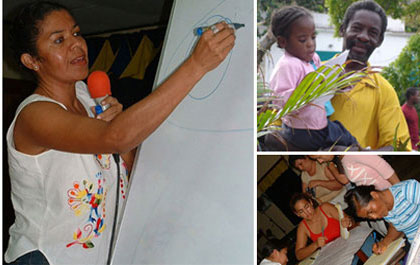




2010 National Summit on a People-Centered Economy: Declaration
We, the National Summit on a People-Centred Economy, which includes members of the co-operative, social and solidarity economy, social enterprise and community economic development movements, declare our determination and our commitment to building a people-centred economy. Our organizations and networks – local, regional, provincial, national and international – are active participants and leaders in a common project to build sustainable communities that are based on the values of social justice, solidarity, economic fairness, environmental justice, inclusion and democracy.
The continued expansion of a People-Centred Economy is essential to the construction of a more just, equitable and sustainable world.
The people-centred economy is plural and firmly established in multiple sectors, including and empowering women, Aboriginal peoples, immigrants, youth, persons with disabilities and other community members experiencing inequity and injustice. Our combined efforts have enabled us to improve the lives of countless people, contributing to the support and creation of thousands of jobs, the revitalization of neighbourhoods and communities, and the improvement or formation of new spaces of social inclusion, mobilization and governance. In doing so we reweave the essence of citizenship and contribution.
Today, we invite all people in Canada to join this movement to establish a People-Centred Economy that seeks a more just response to social, economic and environmental imperatives. We invite all people in Canada to recognize the common challenges we must face together in the decades ahead.
The participants of the Summit commit to co-operation among our organizations, institutions and networks in the task of scaling up the positive results we are producing and continuing to innovate new solutions to the challenges we face. We commit to ongoing gender and diversity analysis to strengthen equity and equality within our work. We commit to extending our collaboration to all those movements and sectors that are prepared to work for a sustainable and equitable future.
Related to the specific themes of the National Summit on a People-Centred Economy we acknowledge we face multiple and inter-related challenges going forward. We can overcome them only if we concentrate our energy on achieving the following actions and encourage women and men in Canada to join us. We want:
• TO INCREASE PEOPLE-CENTRED FINANCE AND INVESTMENT by developing gender-responsive regulatory and tax measures to channel new capital into the community sector including tax incentives, demonstration funds and a hybrid legal structure; by building sector capacity through support for intermediaries and innovation funds; and by funding and conducting research and advocacy that includes gender and diversity analysis, documents social and financial impacts, and identifies a sector profile.
• TO DEVELOP PEOPLE-CENTRED ENTERPRISES by building stronger networks and collaboration between social enterprises; by developing a greater role for social enterprise in economic revitalization strategies and in all areas of government policy; by building partnerships with governments; and by building public education and public awareness as well as educating and training people to participate and work in the sector
• TO PURSUE PEOPLE-CENTRED LOCAL REVITALIZATION by promoting the development of policies that create an enabling environment, including long-term, flexible financial and other support to local, community-based economic development initiatives; by improving access to current and reliable community-level data and supporting community capacity for analysis and evaluation; by strengthening citizen engagement, organizational governance and public mobilization; and by strengthening community voice to government
• TO EXPAND PEOPLE-CENTRED PURCHASING CHOICES by building the capacity of social economy suppliers to meet growing opportunities; by pushing for the creation of a public policy environment that supports procurement policy and the practice of purchasing from social economy businesses; by building new and enhancing existing market and sales relationships with private and social sector purchasers; and by developing intermediary services to facilitate access to and increase in markets; by promoting resource sharing systems; and by developing and promoting a social economy ‘mark.’
• TO BUILD A STRONGER MOVEMENT FOR A PEOPLE-CENTRED ECONOMY by making explicit and following key guiding principles to serve as the basis for this movement; by creating a national roundtable to continue these efforts; by creating space for grassroots participants to be active; through a national communications plan; by building on the national social economy research program, through an ongoing government outreach strategy to support the co-construction of public policy; by creating an internal trade mechanism to maximize purchasing between social economy organizations; by convening a dialogue on formal and informal learning, and by promoting the expansion of adapted sector-owned models supporting the development of a people-centred economy.
• TO FOSTER PEOPLE-CENTRED INTERNATIONAL SOLIDARITY by respecting principles of participation, gender equality, environmental sustainability, fairness and justice; by denouncing government cuts to aid; by working with international networks to promote and build a social solidarity economy; by advocating for Canada to meet its international commitments; by advocating for CIDA’s new priority on economic growth include the social solidarity economy; by supporting efforts for an international solidarity levy, by promoting the importance of people taking charge of their own development; by raising awareness about issues of development; by mobilizing for international trade that is governed by justice and fairness; and by promoting knowledge exchange and the co-construction of public policies.
The people-centred economy has progressed considerably in Canada in recent years, but the gains are still fragile and the challenges substantial. The continued development of a people-centred economy cannot proceed without an overall perspective that draws a link between local, national and planetary, between where something is produced and where it is consumed, and between the worker and the socially aware investor. A people-centred economy cannot be fully realized without the mobilization of society as a whole.
In concluding this Summit, each of us commits to continue mobilizing for a model of development that leaves nobody aside, so that, more than ever before, solidarity will be at the heart of economic activity throughout Canada and around the world.
Ottawa, June 1, 2010
Links
- Award 2011: Millennium Development Research Grant, Shastri Insitute (SICI), 2011
- Constructing a North-South Knowledge Community: Social Science & Humanities Research Council Canada (SSHRC), award 2010
- Development after the Global Meltdown, Shastri Insitute (SICI) award, 2009
- Recent publications by ISHD members
- Universitas Forum, an international journal

